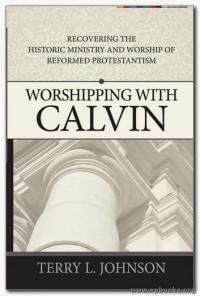AUTHOR: Terry L. Johnson
PUBLISHER: Grand Rapids, MI: Evangelical Press, 2014, (434 pages).
What comes to mind when we think about worship? Is it the continuing argument between contemporary vs traditional worship? Is it about music and song? Is it about the period just before the sermon during a Sunday service?
According to Terry L. Johnson, worship is more than all of the above, and in his own words, "worship is ministry." Choosing to avoid making the book about Calvinism which may dissuade non-Calvinists from the book, Johnson prefers a more open title, open enough to welcome other Christian quarters, and restricted enough to make the book about Reformed theology and worship. Lamenting on the current state of evangelicalism, which is too fragmented, and where many regarded as irrelevant to modern culture, Johnson is convicted that the way back is via "Word-filled Christian worship" which is Reformed worship. Reformed worship comes out of Reformed Practice among Reformed Churches. Reformed Churches is where Reformed ministry and Reformed people are cultivated which in turn develops Reformed piety. Of course, it is not always this linear but the point is that Reformation must be ongoing, and the way to do so is to learn from tradition via history; formation via liturgy; and biblically via exegesis of Scripture. Theologically, Johnson goes back to the Reformation calls for sola Scriptura to guide liturgical practice; sola Christus to reform the Eucharist; sola fide regarding the preaching and teaching of Scripture; sola gratia to reform prayer; soli Deo gloria toward "revival of confidence in the means of grace." These five emphases underpin the five thrusts of "Reformed worship and ministry."
Firstly, in "God-centered" ministry, worship is all about God as our center, our focus, the Person that we fix attention upon. Johnson tackles the two perspectives whether worship ought to be "people-centered or God-centered," arguing for the latter position. He criticizes the seeker-sensitive and other human-centered activities, claiming that edification of the people is not the primary purpose. It cannot be about evangelizing the lost either.
Secondly, it is "Bible-filled" and Johnson dedicates two whole chapters to emphasize this point. Scriptures are to be read, preached, prayed, sung, and any liturgical practices be solely on Scripture. He takes pains to help us learn from the historical development of hymns and how Scriptures are incorporated in the hymns, psalms, and spiritual songs. Sacramentally, the Word of God is visible in the liturgies of the Eucharist, Baptism, and gives some observations about the the visual arts, and how they can help us visualize worship through rituals and images. Yet, he has strong words against the use of images. Johnson understands Calvin's position that images can lead to idolatry, and concludes the need toward simplicity.
Thirdly, it is "Gospel-Structured" that sees our entire worship service as an expression of our need for Christ. Johnson shows us that the first half of the worship service is about proclaiming the gospel, and the second half to underscore our dependence on Christ for living. From confessions and prayer to preaching and proclamation of the Word, the people of God declares their need for Christ and how the world too needs Christ.
Fourthly, it is "Church-Aware" which takes the Church seriously. Being church is about covenanting between God and the people of God. Johnson is fully aware of the disappointments of people who have become disillusioned with the Church. The way ahead is to return to the historic Reformed Church because the modern Church has become too "market-drive, seeker-driven." He proposes a threefold approach worship with the church traditions of the past through learning their forms; b) join hands with church traditions of the future through developing Scripture songs; c) universal practices with the church of the present, to cultivate the communion of saints.
Fifthly, it is "Spirit-Dependent" and Trinitarian worship. At all points of any worship service, we need to depend on the Spirit to lead and to guide, through the Word, in prayer, devoted simplicity, and the middle way.
So What?
I agree with Johnson that the "worship wars" are essentially cultural wars. Every generation will tend to assume the latest is the greatest. Such a mood is very short-sighted and robs us from learning of the rich traditions and histories of the past. There is a lot of good and powerful experiences that our forefathers have laid out for us. It is easy for modern practitioners to throw away the old in favour of the new, but we do so at a high risk. We may unwittingly create a liturgical vacuum that modern techniques and content are poor substitutes. Rather than to re-invent our own styles and new forms of worship, it is better that we learn from the past, adopt the Reformed traditions and develop a form that is appropriate and above all, based on Scriptures.
Johnson is well read and references a lot to both the past as well as contemporary writers. In doing so, he has made his work as one that regards the past respectfully and the present moods sensitively. Well laid out and argued, this book is a way in for evangelicals to learn to worship with Calvin as a people who are God-centered, Bible-filled, Gospel-Structured, Church-aware, and Spirit-Dependent. I appreciate the way Johnson titles the book as "worshiping with Calvin" which makes it a lot more open, rather than some title like "Calvinistic worship" or "Reformed worship."
Rating: 4.25 stars of 5.
conrade
This book is provided to me courtesy of Evangelical Press and Cross-Focused Reviews in exchange for an honest review. All opinions offered above are mine unless otherwise stated or implied.

No comments:
Post a Comment